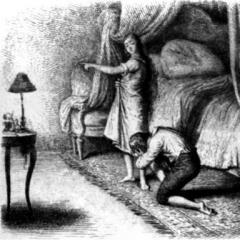The sum of 100 natural numbers is 5130. We give another decision of the C)
Video course "Get Five" includes all themes required for successful surchase EGE In mathematics at 60-65 points. Fully all tasks 1-13 Profile EME mathematics. It is also suitable for the commissioning of the basic ege in mathematics. If you want to pass the exam for 90-100 points, you need to solve part 1 in 30 minutes and without errors!
Course preparation for the exam for 10-11 class, as well as for teachers. Everything you need to solve part 1 of the EGE in mathematics (the first 12 tasks) and the task 13 (trigonometry). And this is more than 70 points on the exam, and without them it is not to do with the stuffer, nor Humanitara.
All the necessary theory. Quick ways of solving, traps and secrets of the exam. All actual tasks of part 1 from the Bank of Oppi tasks are disassembled. The course fully complies with the requirements of the EGE-2018.
The course contains 5 large topics, for 2.5 hours each. Each topic is given from scratch, just and understandable.
Hundreds of tasks to the exam. Text tasks and theory of probability. Simple and easily memorable task solving algorithms. Geometry. Theory, reference material, analysis of all types of assignments of the USE. Stereometry. Clamp techniques of solutions, useful cribs, the development of spatial imagination. Trigonometry from scratch - to task 13. Understanding instead of shock. Visual explanation complex concepts. Algebra. Roots, degrees and logarithms, function and derivative. The base for solving complex tasks 2 parts of the exam.
100 different board written on the board natural numbers With the amount of 5120.
a) Can the number 230 be recorded?
b) Is it possible to do without a number 14?
c) What the smallest number of numbers, multiple 14, maybe on the board?
Decision.
a) Let the number 230 and 99 of other different natural numbers be written on the board. The minimum possible amount of numbers on the board is achieved under the condition that the sum of 99 different natural numbers is minimal. And this, in turn, perhaps, if 99 different natural numbers are arithmetic progression with the first member and difference amount of these numbers, by the formula of the amount arithmetic progression, will be:
The sum of all numbers on the board S. will be equal to:
It is easy to see that the resulting amount is greater than 5120, which means that any amount of 100 different natural numbers, among which there are 230, more than 5120, therefore, the number 230 on the board can not be.
b) Let the number 14 not recorded on the board. In this case, the minimum possible amount S. The numbers on the board will consist of two amounts of arithmetic progress: the sums of the first 13 members of the progression with the first member, the difference (i.e., a number of 1,2,3, .. 13) and the sums of the first 87 members of the progression with the first member, the difference (that is, a number of 15,16,17, .. 101). We will find this amount:
It is easy to see that the resulting amount is greater than 5120, which means that any amount of 100 different natural numbers, among which there are no 14, more than 5120, therefore, without a number 14, it is impossible to do without a number.
c) Suppose that there are all numbers from 1 to 100 on the board. Then it turns out that the resulting row is an arithmetic progression with the first member, the difference in the formula for the amount of arithmetic progression we will find the amount of all numbers on the board:
The resulting amount does not satisfy the condition of the problem. Now, in order to increase the amount of all numbers written on the board to the designated in the condition, we will try to replace numbers, multiple 14 to other numbers following a hundred: 70 Replace 110, 84 - by 104, and 98 - by 108. The result S. will be equal to:
With a further replacement of numbers, multiple 14 per numbers, large 100, the amount will increase and do not fit the condition of the problem. Thus, the smallest number of numbers, multiple 14 equal to 4.
We give another decision of the C).
Let us give an example when four numbers are written on the board, multiple 14 (14, 28, 42, 56):
1, 2, ... , 69, 71, 72, ... , 83, 85, 86, ... , 97, 100, 101, 102, 103, 115.
We prove that there can be no three numbers, multiple 14. To remove the maximum number of numbers, multiple 14, it is necessary that the differences between new and old numbers are minimal. That is, it is necessary to replace the greatest numbers, multiple 14, to the smallest possible, large hundred years. Let the number of numbers, multiple 14, is 3. Then the minimum amount of numbers recorded on the board is equal to:
The resulting amount is greater than 5120. With a further replacement of numbers, multiple 14, numbers, large 100, the amount will increase, it means that there can be no less than four numbers on the board, multiple 14.
A) no b) no c) 4.
On the board, 100 different natural numbers are written with the amount of 5120.
a) Can the number 230 be recorded?
b) Is it possible to do without a number 14?
c) What the smallest number of numbers, multiple 14, maybe on the board?
Decision.
a) Let the number 230 and 99 of other different natural numbers be written on the board. The minimum possible amount of numbers on the board is achieved under the condition that the sum of 99 different natural numbers is minimal. And this, in turn, it is possible if 99 different natural numbers are arithmetic progression with the first term and difference amount of these numbers, according to the formula of the sum of arithmetic progression, will be:
The sum of all numbers on the board S. will be equal to:
It is easy to see that the resulting amount is greater than 5120, which means that any amount of 100 different natural numbers, among which there are 230, more than 5120, therefore, the number 230 on the board can not be.
b) Let the number 14 not recorded on the board. In this case, the minimum possible amount S. The numbers on the board will consist of two amounts of arithmetic progress: the sums of the first 13 members of the progression with the first member, the difference (i.e., a number of 1,2,3, .. 13) and the sums of the first 87 members of the progression with the first member, the difference (that is, a number of 15,16,17, .. 101). We will find this amount:
It is easy to see that the resulting amount is greater than 5120, which means that any amount of 100 different natural numbers, among which there are no 14, more than 5120, therefore, without a number 14, it is impossible to do without a number.
c) Suppose that there are all numbers from 1 to 100 on the board. Then it turns out that the resulting row is an arithmetic progression with the first member, the difference in the formula for the amount of arithmetic progression we will find the amount of all numbers on the board:
The resulting amount does not satisfy the condition of the problem. Now, in order to increase the amount of all numbers written on the board to the designated in the condition, we will try to replace numbers, multiple 14 to other numbers following a hundred: 70 Replace 110, 84 - by 104, and 98 - by 108. The result S. will be equal to:
With a further replacement of numbers, multiple 14 per numbers, large 100, the amount will increase and do not fit the condition of the problem. Thus, the smallest number of numbers, multiple 14 equal to 4.
We give another decision of the C).
Let us give an example when four numbers are written on the board, multiple 14 (14, 28, 42, 56):
1, 2, ... , 69, 71, 72, ... , 83, 85, 86, ... , 97, 100, 101, 102, 103, 115.
We prove that there can be no three numbers, multiple 14. To remove the maximum number of numbers, multiple 14, it is necessary that the differences between new and old numbers are minimal. That is, it is necessary to replace the greatest numbers, multiple 14, to the smallest possible, large hundred years. Let the number of numbers, multiple 14, is 3. Then the minimum amount of numbers recorded on the board is equal to:
The resulting amount is greater than 5120. With a further replacement of numbers, multiple 14, numbers, large 100, the amount will increase, it means that there can be no less than four numbers on the board, multiple 14.
A) no b) no c) 4.


